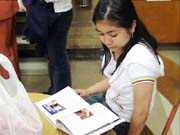Above shelves filled with 50 new books about the Philippines at the Jersey City Library’s Five Corners Branch is a drawing of a grasshopper.
Its name is Dodong Tipaklong, or “Little Grasshopper.”
“It can also mean a child grasshopper,” said Nimia Lacebal, president of the Filipino civic organization Laguna and Friends, Inc. Lacebal joined members of the Heights section’s Filipino community and the Philippine Counsel Millicent Paredes for the dedication of the newest addition to the library’s Filipino collection recently.
“Children in the Philippines like the grasshopper, so we made it the mascot for the program,” Lacebal added.
The program Lacebal refers to the year-old Read Philippines, an outreach project done in coordination between various East Coast Filipino civic and social groups and the Filipino Consulate in New York City.
“One of the objects of the program is to educate second generation Filipino children and young adults about their cultural heritage,” said Lacebal. Books added to the collection cover subjects like Filipino history and cultural concerns such as cuisine and clothing.
Five Corners library was one of four libraries in North Jersey that are serving as a pilot program for the Read Philippines project. The other libraries are in Elmhurst, Union and Passaic, Paredes said.
“If this goes well, we can expand the project to other communities,” she said.
One book, titled Habi, is about the traditional tribal dress in the Philippines. Made out of dried fibers from banana leaves and pineapples and a strong cotton fiber, the Habi is worn at state occasions and to similar events that require representation of the different tribal groups. Each tribe has an identifiable color and design on the Habi clothing, according to Lacebal, with most of the garments, which include coats and skirts, being handmade.
The other garment special to the Philippines is the barong tagalong, a loose fitting shirt worn by politicians and community leaders. Lacebal said the usually white-colored shirt is made from native fibers and has various print designs on the front of the shirt.
As soon as the collection opened to the public, it was already being used by a young member of the Philippine community.
“I’m interested in cooking,” said 19-year-old Therese Dublin, who was studying a volume on Philippine cuisine. “This is the stuff I’m looking for.”
Jose Rizal
Featured in the expanded Five Corners Pilipino book collection are a number of books by and about Jose Rizal, a national hero of the Philippines. Rizal was the author of two of the most famous novels in Philippine literature: Noli Me Tangere, a satirical novel of the clergy who were part of the ruling Spanish government in the Philippines before the Spanish-American War, and the novel’s sequel, El Filbusterio. Both books, according to Paredes, stirred up controversy when they were published in 1880s and helped engender the Philippine nationalist movement. Rizal was persecuted by Spanish authorities, exiled and eventually executed on charges of rebellion and sedition against the Spanish authorities in 1896.
“Rizal is a great man in the Philippines,” said Paredes. “The younger generation needs to know about him.”
Proud to be chosen
Addressing the assembled dignitaries and library patrons in the Five Corners library auditorium, Paredes stressed the importance of community participation in expanding the Read Philippines project.
“We encourage those who are traveling back to the Philippines to bring back one or two books which can be donated to the collection,” Paredes suggested. “We would also like people from the community to make donations to the collection.”
Five Corners Director Susan Stewart said she was proud the library had been chosen to be part of the Read Philippines.
“This is a real honor for our branch,” said Stewart.
The library was first contacted by the Read Philippines project last summer to get the collection started.
“We started talking and planning back then, and now the collection is here,” Stewart said.
The Five Corners Library, located a few blocks from Journal Square, is utilized by members of the city’s diverse ethnic communities. Among its stacks are Indian and Arabic books, magazines and videos. Stewart said the Philippine community, which has a large concentration in the area of the Five Corners Library, uses the facility often.
“I would estimate that 10 percent of our patrons are Philippine in background,” Stewart noted.
